五年级上册英语素材-知识要点 鲁科版(五四制,三起)
- 格式:docx
- 大小:23.19 KB
- 文档页数:6
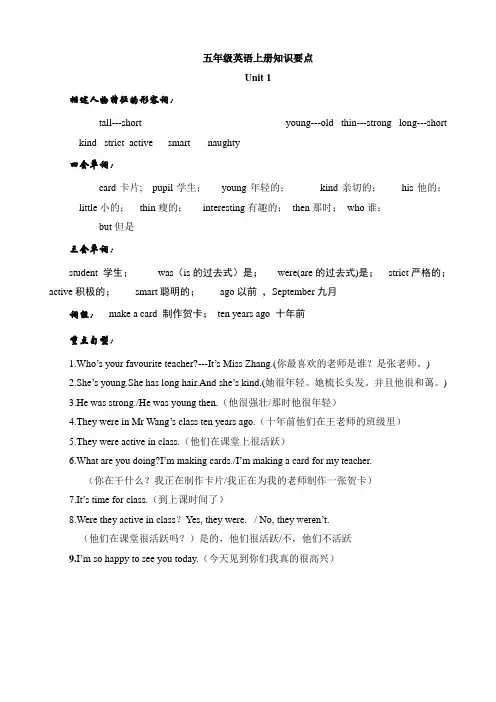
五年级英语上册知识要点Unit 1描述人物特征的形容词:tall---short young---old thin---strong long---short kind strict active smart naughty四会单词:card卡片; pupil学生;young年轻的;kind亲切的;his他的;little小的;thin瘦的;interesting有趣的;then那时;who谁;but但是三会单词:student 学生;was(is的过去式)是;were(are的过去式)是;strict严格的;active积极的;smart聪明的;ago以前,September九月词组:make a card 制作贺卡;ten years ago 十年前重点句型:1.Who’s your favourite teacher?---It’s Miss Zhang.(你最喜欢的老师是谁?是张老师。
)2.She’s young.She has long hair.And she’s kind.(她很年轻。
她梳长头发。
并且他很和蔼。
)3.He was strong./He was young then.(他很强壮/那时他很年轻)4.They were in Mr Wang’s class ten years ago.(十年前他们在王老师的班级里)5.They were active in class.(他们在课堂上很活跃)6.What are you doing?I’m making cards./I’m making a card for my teacher.(你在干什么?我正在制作卡片/我正在为我的老师制作一张贺卡)7.It’s time for class.(到上课时间了)8.Were they active in class?Yes, they were. / No, they weren’t.(他们在课堂很活跃吗?)是的,他们很活跃/不,他们不活跃9.I’m so happy to see you today.(今天见到你们我真的很高兴)Unit 2四会单词:look看起来;find找到;worry担心;angry生气的;sad难过的;late迟到;why为什么;yesterday昨天;with 和…在一起三会单词:sky天空;lost(lose的过去式,过去分词)丢失;saw(see的过去式)看见;wasn’t. (was not)不是excited激动的;glad高兴的;worried担心的;poor可怜的;helpful有帮助的词组:come back 回来;come in 进来;重点句型:1.He’s excited.(他很兴奋)2He was sad.(他很伤心)3Was he happy?---Yes,he was./No, he wasn’t.(他很高兴吗?是的,他高兴/不是,他不高兴)4---Wang Hong is worried.Why?---She can’t find her English book.王红很担心,为什么?她找不到她的英语书了。

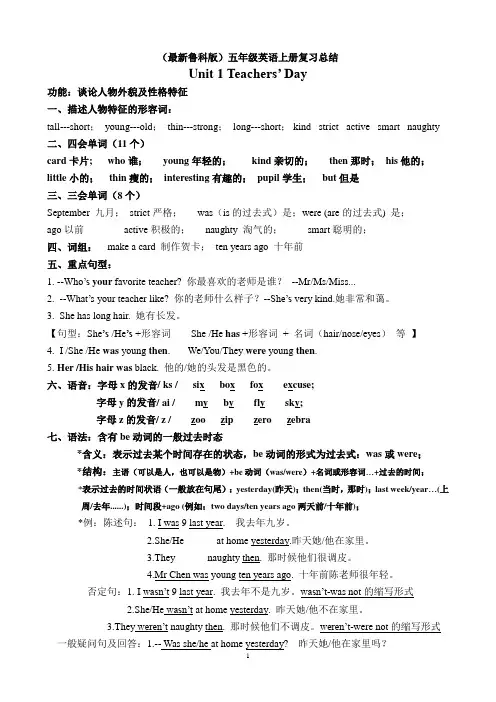
(最新鲁科版)五年级英语上册复习总结Unit 1 Teachers’ Day功能:谈论人物外貌及性格特征一、描述人物特征的形容词:tall---short;young---old; thin---strong; long---short; kind strict active smart naughty 二、四会单词(11个)card卡片; who谁;young年轻的;kind亲切的;then那时;his他的;little小的;thin瘦的;interesting有趣的;pupil学生;but但是三、三会单词(8个)September 九月;strict严格;was(is的过去式)是;were (are的过去式) 是;ago以前active积极的;naughty 淘气的;smart聪明的;四、词组:make a card 制作贺卡;ten years ago 十年前五、重点句型:1. --Who’s your favorite teacher? 你最喜欢的老师是谁?--Mr/Ms/Miss...2. --What’s your teacher like? 你的老师什么样子?--She’s very kind.她非常和蔼。
3. She has long hair. 她有长发。
【句型:She’s /He’s+形容词She /He has +形容词+ 名词(hair/nose/eyes)等】4. I /She /He was young then. We/You/They were young then.5. Her /His hair was black. 他的/她的头发是黑色的。
六、语音:字母x的发音/ ks / six box fox excuse;字母y的发音/ ai / my by fly sky;字母z的发音/ z / zoo zip zero zebra七、语法:含有be动词的一般过去时态*含义:表示过去某个时间存在的状态,be动词的形式为过去式:was或were;*结构:主语(可以是人,也可以是物)+be动词(was/were)+名词或形容词…+过去的时间;*表示过去的时间状语(一般放在句尾):yesterday(昨天);then(当时,那时);last week/year…(上周/去年......);时间段+ago (例如:two days/ten years ago两天前/十年前);*例:陈述句:1. I was 9 last year. 我去年九岁。
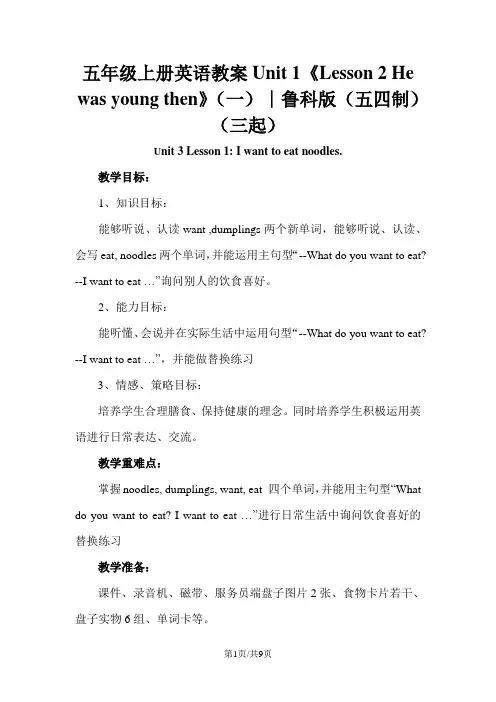
五年级上册英语教案Unit 1《Lesson 2 He was young then》(一)∣鲁科版(五四制)(三起)U nit 3 Lesson 1: I want to eat noodles.教学目标:1、知识目标:能够听说、认读want ,dumplings两个新单词,能够听说、认读、会写eat, noodles两个单词,并能运用主句型“--What do you want to eat? --I want to eat …”询问别人的饮食喜好。
2、能力目标:能听懂、会说并在实际生活中运用句型“--What do you want to eat? --I want to eat …”,并能做替换练习3、情感、策略目标:培养学生合理膳食、保持健康的理念。
同时培养学生积极运用英语进行日常表达、交流。
教学重难点:掌握noodles, dumplings, want, eat 四个单词,并能用主句型“What do you want to eat? I want to eat …”进行日常生活中询问饮食喜好的替换练习教学准备:课件、录音机、磁带、服务员端盘子图片2张、食物卡片若干、盘子实物6组、单词卡等。
教学步骤:Step1: Warm up(热身)1, Greeting:Teacher (T): Good morning, boys and girls. Nice to meet you. Students (Ss): Nice to meet you, too.T: Today I’m glad to have this class with you.First, I want to know something about you, OK?S: OK.2, Free talk:T: This boy, what’s your name, please?S1: My name is …T: Nice to meet you.S1: Nice to meet you, too.T: And this beautiful girl, may I have your name?S2: My name is …T: Nice to meet you.S2: Nice to meet you, too.T: Do you like fish?S2: Yes, I like fish very much.T: Great! I like fish, too.T: And this boy, let me know you, OK?S3: My name is …T: Oh, you’re cool. And do you like chicken?S3: Yes, I like chicken.T:Oh, I know.【设计意图】通过与学生打招呼,进行简单日常交流,询问他们是否喜欢鱼或鸡腿之类的食物,顺势自然过渡到食物上来,从而引入美食街,进入主情境Step 2: Presentation(学习新知):1, Enjoy the gourmet street’s pictures:T: Now, boys and girls. I know you like yummy food. And I like delicious food, too. And several days ago, I went to a gourmet street and take some photos about the delicious food. Now let’s enjoy them, OK?Ss: OK.Show the pictures with a beautiful song.【设计意图】欣赏美食街图片,从而激发学生学习新词、运用新句的兴趣。
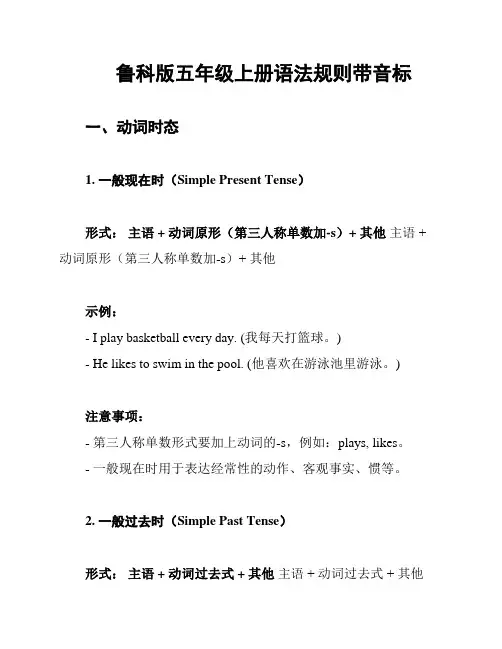
鲁科版五年级上册语法规则带音标一、动词时态1. 一般现在时(Simple Present Tense)形式:主语 + 动词原形(第三人称单数加-s)+ 其他主语 + 动词原形(第三人称单数加-s)+ 其他示例:- I play basketball every day. (我每天打篮球。
)- He likes to swim in the pool. (他喜欢在游泳池里游泳。
)注意事项:- 第三人称单数形式要加上动词的-s,例如:plays, likes。
- 一般现在时用于表达经常性的动作、客观事实、惯等。
2. 一般过去时(Simple Past Tense)形式:主语 + 动词过去式 + 其他主语 + 动词过去式 + 其他示例:- They visited their grandparents last weekend. (他们上个周末去拜访了他们的祖父母。
)- She played the piano at the concert. (她在音乐会上弹钢琴。
)注意事项:- 动词的过去式通常是在动词原形基础上加上-ed,例如:visited, played。
- 一般过去时用于表示过去的动作或状态。
3. 现在进行时(Present Continuous Tense)形式:主语 + am/is/are + 动词ing + 其他主语 + am/is/are + 动词ing + 其他示例:- They are studying English now. (他们现在正在学英语。
)- She is playing tennis in the park. (她正在公园里打网球。
)注意事项:- 动词进行时的构成是在动词原形基础上加上-ing,例如:studying, playing。
- 现在进行时用于表示正在进行的动作。
二、名词复数形式1. 一般名词复数形式形式:单数名词 + -s单数名词 + -s示例:- The book has many pictures. (这本书有很多图片。
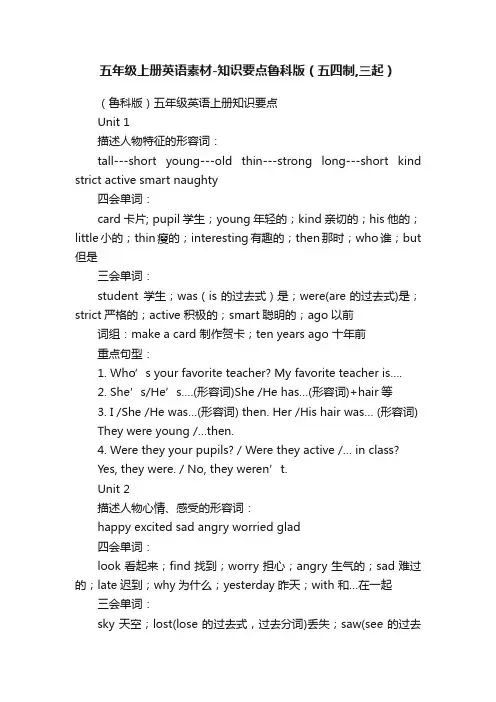
五年级上册英语素材-知识要点鲁科版(五四制,三起)(鲁科版)五年级英语上册知识要点Unit 1描述人物特征的形容词:tall---short young---old thin---strong long---short kind strict active smart naughty四会单词:card卡片; pupil学生;young年轻的;kind亲切的;his他的;little小的;thin瘦的;interesting有趣的;then那时;who谁;but 但是三会单词:student 学生;was(is的过去式)是;were(are的过去式)是;strict严格的;active 积极的;smart聪明的;ago以前词组:make a card 制作贺卡;ten years ago 十年前重点句型:1. Who’s your favorite teacher? My favorite teacher is….2. She’s/He’s….(形容词)She /He has…(形容词)+hair等3. I /She /He was…(形容词) then. Her /His hair was… (形容词)They were young /…then.4. Were they your pupils? / Were they active /… in class?Yes, they were. / No, they weren’t.Unit 2描述人物心情、感受的形容词:happy excited sad angry worried glad四会单词:look看起来;find找到;worry担心;angry生气的;sad难过的;late迟到;why为什么;yesterday昨天;with 和…在一起三会单词:sky天空;lost(lose的过去式,过去分词)丢失;saw(see的过去式)看见;excited激动的;glad高兴的;worried担心的;poor可怜的;helpful有帮助的词组:come back 回来;come in 进来;重点句型:1. What’s Danny /…do ing? He’s /She’s dancing/… in the rain.2. He’s excited. The sky is angry. Wang Hong is worried.3. Were you happy? Yes, I was. / No, I wasn’t.4. Was Danny with you? Yes, he was. / No, he wasn’t.5. You look worried. I can’t find my English book /….Unit 3月份:January February March April May June JulyAugust September October November December描述生日活动的短语:open the present sing the birthday song eat some cake take picturesplay games sing and dance四会单词:party聚会; song歌曲;children孩子们;open打开;when什么时候三会单词:March三月;May五月;April四月;October十月;present礼物;wish愿望;had(have的过去式)有;did(do的过去式);sang(sing的过去式)唱,唱歌;made(make的过去式)制造,做;ate(eat的过去式)吃;词组:have a party 举办宴会;sing a song 唱歌;make a wish 许愿;重点句型:1. When is your birthday? My birthday is in May. / It’s in March.2. --Happy birthday! ---Thank you. ---Open the present, please. ---OK.3. What did you do at the party? We sang and danced. / atea big cake.4. How was the party? It was great.Unit 4日常学校活动短语:do sports read books make things tell stories play football draw pictures play the piano watch films play basketball四会单词:film电影tree树photo照片;story故事;sit坐;tell讲,告诉;busy忙碌的after在…以后三会单词:French法语;reading阅读;building建筑物;group组;circle 圆;send发送,寄;different不同的;really真的,是吗?词组:watch films 看电影;tell stories讲故事in groups成群结队地in a circle围成一个圈;重点句型:1. What’s subjects does she have? She has science, maths and French.2. What does she do after school?She often draws pictures. Sometimes she watches films.3. What’s your new school like? It’s not big, but very beautiful.4. There is a new gym in my school. There is an old building in my schoo l.There are many flowers and trees. There are many books in it.5. How many pupils are there in your class? There are twenty.6. What are you doing in groups?Some are making things. Some are telling stories.Unit 5运动方面的短语:play table tennis /football /basketball have a football match jump highget the ball run to the basket shoot a basket pass the ballwin the match join the ….Club四会单词:ball 球;try尝试;get得到;high高;easy容易的;again再一次;三会单词:club 俱乐部;match比赛;basket(篮球运动的)篮;join参加;win获胜;pass传递;got(get 的过去式)得到;won(win的过去式)获胜;last最后的;词组:table tennis乒乓球:try again再试试;play well做的好;jump high跳的高;重点句型:1. ---What sport do you like? ---I like basketball /….2. What club would you li ke to join? I’d like to join the Table Tennis Club.3. Li Ming plays well. He jumps very high.He’s running to the basket.4. What sport did you play yesterday? We played football.Unit 6有关圣诞活动的短语:get together have a big dinner sing Christmas songs get presentsdecorate the Christmas tree Help yourselves. put the star hereput the lights on the tree put the stocking at the end of my bedput the balls on the tree put a present in the stocking四会单词:bag 包;star星星;light灯;dress连衣裙;animal动物;evening晚上;bring带来;三会单词:Christmas圣诞节;December十二月;laugh笑;went(go的过去式)去;said(say的过去式)说;together在一起;词组:get together聚在一起;at the end of… 在…的最后重点句型:1. When is Christmas Day? It’s December 25.2. What do you usually do at Christmas? The family get together. We havea big dinner. We sing Christmas songs. We get presents from Santa.3. Let’s decorate the Christmas tree. What will you do?I will put the star here. I will put the lights /balls on the tree.4.What presents did you get? I got a book about animals.Unit 7有关春节活动的短语:clean the home buy flowers eat jiaozi watch TV visit relatives wear new clothes set off fireworks travel to… make jiaoziget lucky money say “Happy Spring Festival” to each other 四会单词:ask 问;wonderful精彩的;next下一个;early时间早;before 在…以前;三会单词:January 一月;February二月;relative亲戚;country乡村;came(come的过去式)来;fun 有趣的,乐趣;词组:the Spring Festival 春节;set off 使?爆炸;lucky money 压岁钱;重点句型:1. When is Spring Festival? It’s usually in February. Sometimes it’s in January.2. What do you usually do at Spring Festival?We clean our home.We buy flowers and new clothes.We wear new clothes. We visit relatives and friends. We usually eat jiaozi. We set off fireworks.3. Did you go to your grandparents’ house? Yes, we did. / No, we didn’t.4. ---What will you do tomorrow?---We’ll get lucky money. We’ll say “Happy Spring Festival” to each other.所学动词过去式的变化规律一般情况下,动词词尾加 -ed 如: visit---visited play---played watch----watched pass----passed 以不发音的 -e 结尾动词,动词词尾加 -d,如:like---liked dance----danced不规则动词的过去式变化规律性不强,须多加记忆。
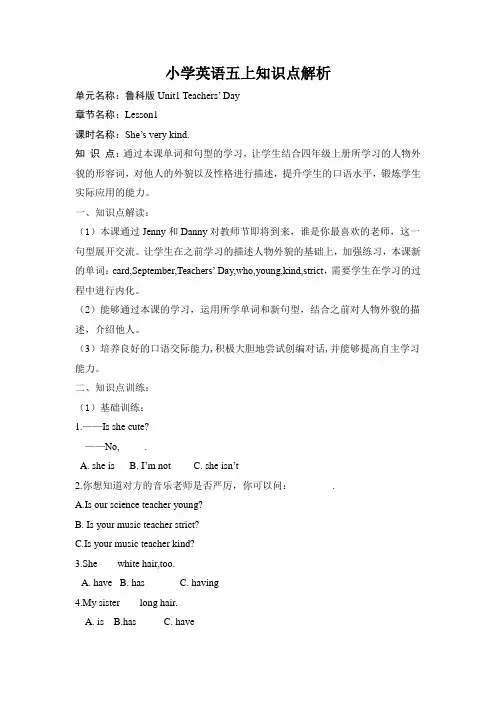
小学英语五上知识点解析单元名称:鲁科版Unit1 Teachers’ Day章节名称:Lesson1课时名称:She’s very kind.知识点:通过本课单词和句型的学习,让学生结合四年级上册所学习的人物外貌的形容词,对他人的外貌以及性格进行描述,提升学生的口语水平,锻炼学生实际应用的能力。
一、知识点解读:(1)本课通过Jenny和Danny对教师节即将到来,谁是你最喜欢的老师,这一句型展开交流。
让学生在之前学习的描述人物外貌的基础上,加强练习,本课新的单词:card,September,Teachers’ Day,who,young,kind,strict,需要学生在学习的过程中进行内化。
(2)能够通过本课的学习,运用所学单词和新句型,结合之前对人物外貌的描述,介绍他人。
(3)培养良好的口语交际能力,积极大胆地尝试创编对话,并能够提高自主学习能力。
二、知识点训练:(1)基础训练:1.——Is she cute?——No,_____.A. she isB. I’m notC. she isn’t2.你想知道对方的音乐老师是否严厉,你可以问:________.A.Is our science teacher young?B. Is your music teacher strict?C.Is your music teacher kind?3.She____white hair,too.A. haveB. hasC. having4.My sister____long hair.A. isB.hasC. have5.别人想知道你的爸爸个子是否高,会问: .A.Is your dad tall?B. Is your dad short?C. Is your dad has long hair?6.Danny has____short hair.A.aB. anC. /7.Tomorrow is September 10.It’s________.A.Teachers’ DayB.Children’s DayC.Mother’s Day(2)能力训练:1.Jenny has _______ hair.2.She is short. She has long hair.A.√B.ו3._____the third day of September.A.9月3日B.9月5日(3)拓展训练:1.阅读短文。
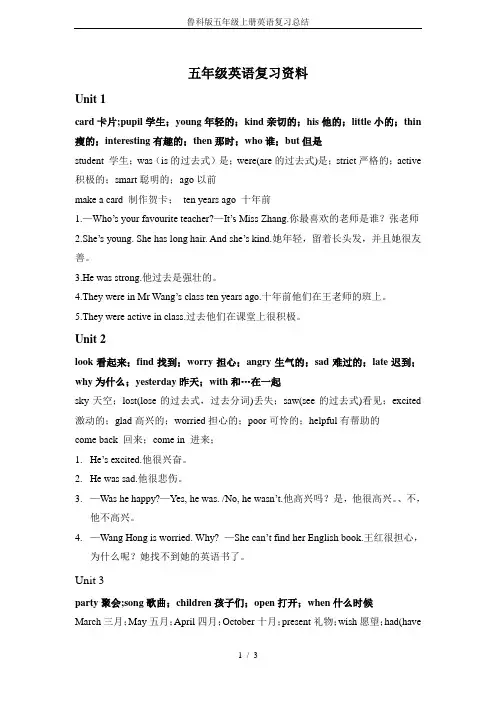
五年级英语复习资料Unit 1card卡片;pupil学生;young年轻的;kind亲切的;his他的;little小的;thin 瘦的;interesting有趣的;then那时;who谁;but但是student 学生;was(is的过去式)是;were(are的过去式)是;strict严格的;active 积极的;smart聪明的;ago以前make a card 制作贺卡;ten years ago 十年前1.—Who’s your favourite teacher?—It’s Miss Zhang.你最喜欢的老师是谁?张老师2.She’s young. She has long hair. And she’s kind.她年轻,留着长头发,并且她很友善。
3.He was strong.他过去是强壮的。
4.They were in Mr Wang’s class ten years ago.十年前他们在王老师的班上。
5.They were active in class.过去他们在课堂上很积极。
Unit 2look看起来;find找到;worry担心;angry生气的;sad难过的;late迟到;why为什么;yesterday昨天;with和…在一起sky天空;lost(lose的过去式,过去分词)丢失;saw(see的过去式)看见;excited 激动的;glad高兴的;worried担心的;poor可怜的;helpful有帮助的come back 回来;come in 进来;1.He’s excited.他很兴奋。
2.He was sad.他很悲伤。
3.—Was he happy?—Yes, he was. /No, he wasn’t.他高兴吗?是,他很高兴。
、不,他不高兴。
4.—Wang Hong is worried. Why? —She can’t find her English book.王红很担心,为什么呢?她找不到她的英语书了。
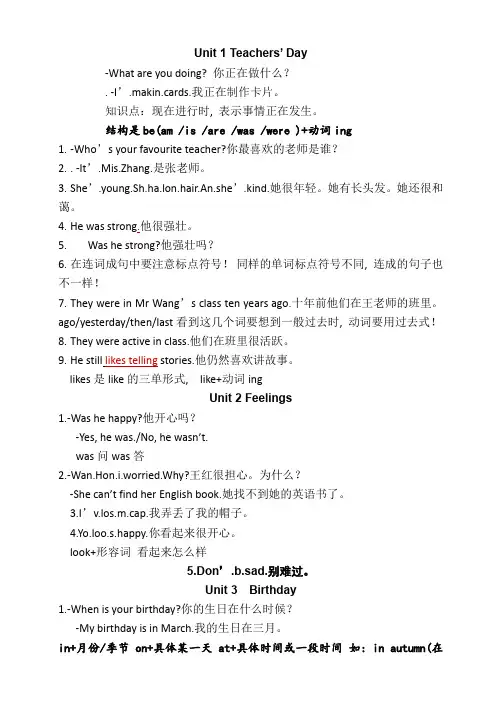
Unit 1 Teachers’ Day-What are you doing? 你正在做什么?. -I’.makin.cards.我正在制作卡片。
知识点:现在进行时, 表示事情正在发生。
结构是be(am /is /are /was /were )+动词ing1.-Who’s your favourite teacher?你最喜欢的老师是谁?2.. -It’.Mis.Zhang.是张老师。
3.She’.young.Sh.ha.lon.hair.An.she’.kind.她很年轻。
她有长头发。
她还很和蔼。
4.He was strong.他很强壮。
5.Was he strong?他强壮吗?6.在连词成句中要注意标点符号!同样的单词标点符号不同, 连成的句子也不一样!7.They were in Mr Wang’s class ten years ago.十年前他们在王老师的班里。
ago/yesterday/then/last看到这几个词要想到一般过去时, 动词要用过去式!8.They were active in class.他们在班里很活跃。
9.He still likes telling stories.他仍然喜欢讲故事。
likes是like的三单形式, like+动词ingUnit 2 Feelings1.-Was he happy?他开心吗?-Yes, he was./No, he wasn’t.was问was答2.-Wan.Hon.i.worried.Why?王红很担心。
为什么?-She can’t find her English book.她找不到她的英语书了。
3.I’v.los.m.cap.我弄丢了我的帽子。
4.Yo.loo.s.happy.你看起来很开心。
look+形容词看起来怎么样5.Don’.b.sad.别难过。
Unit 3 Birthday1.-When is your birthday?你的生日在什么时候?-My birthday is in March.我的生日在三月。
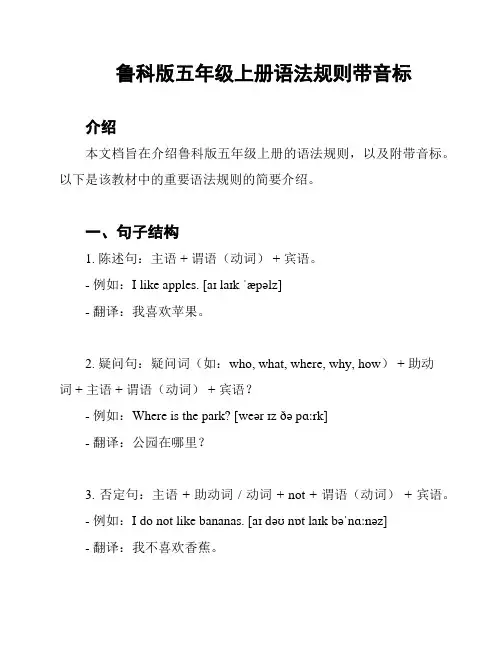
鲁科版五年级上册语法规则带音标介绍本文档旨在介绍鲁科版五年级上册的语法规则,以及附带音标。
以下是该教材中的重要语法规则的简要介绍。
一、句子结构1. 陈述句:主语 + 谓语(动词) + 宾语。
- 例如:I like apples. [aɪ laɪk ˈæpəlz]- 翻译:我喜欢苹果。
2. 疑问句:疑问词(如:who, what, where, why, how) + 助动词 + 主语 + 谓语(动词) + 宾语?- 例如:Where is the park? [weər ɪz ðə pɑːrk]- 翻译:公园在哪里?3. 否定句:主语 + 助动词 / 动词 + not + 谓语(动词) + 宾语。
- 例如:I do not like bananas. [aɪ dəʊ nɒt laɪk bəˈnɑːnəz]- 翻译:我不喜欢香蕉。
二、词类1. 名词(Noun):表示人、物、地方或抽象概念的词语。
- 例如:dog [dɒɡ](狗)、book [bʊk](书)2. 动词(Verb):表示动作或状态的词语。
- 例如:go [ɡəʊ](去)、run [rʌn](跑)3. 形容词(Adjective):修饰名词或代词的词语。
- 例如:big [bɪɡ](大的)、happy [ˈhæpi](快乐的)4. 副词(Adverb):修饰动词、形容词、副词或整个句子的词语。
- 例如:slowly [ˈsləʊli](慢慢地)、very [ˈveri](非常)5. 代词(Pronoun):用来代替名词的词语。
- 例如:he [hiː](他)、she [ʃiː](她)6. 冠词(Article):用来限定名词的词语。
- 例如:a [ə](一个)、an [ən](一个,用于元音开头的单词)7. 介词(Preposition):表示位置、时间、原因、目的等关系的词语。
- 例如:in [ɪn](在)、on [ɒn](在)8. 连词(Conjunction):连接词与词、短语与短语、句子与句子的词语。
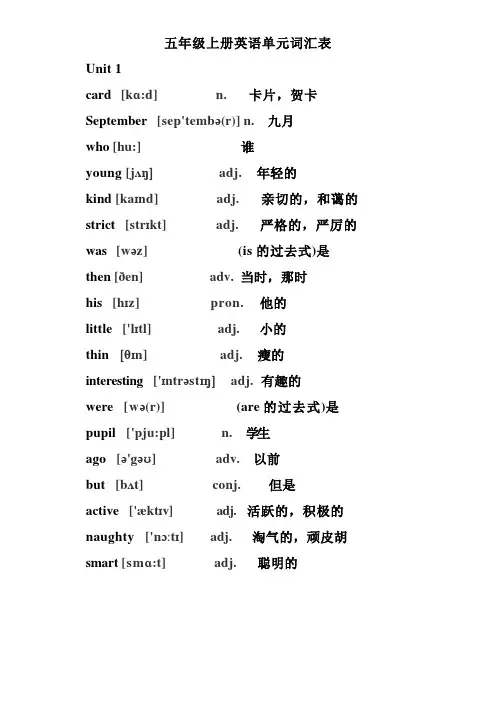
五年级上册英语单元词汇表Unit 1card [kɑ:d] n. 卡片,贺卡September [sep'tembə(r)] n. 九月who [hu:] 谁young [jʌŋ] adj. 年轻的kind [kaɪnd] adj. 亲切的,和蔼的 strict [strɪkt] adj. 严格的,严厉的 was [wəz] (is的过去式)是then [ðen] adv. 当时,那时his [hɪz] pron. 他的little ['lɪtl] adj. 小的thin [θɪn] adj. 瘦的interesting['ɪntrəstɪŋ] adj. 有趣的were [wə(r)] (are的过去式)是pupil ['pju:pl] n. 学生ago [ə'gəʊ] adv. 以前but [bʌt] conj. 但是active ['æktɪv] adj. 活跃的,积极的 naughty ['nɔːtɪ] adj. 淘气的,顽皮胡 smart [smɑ:t] adj. 聪明的Unit 1 默写words卡片,贺卡n._______ (复数形式)__________ 九月n. ____________ 谁__________年轻的adj. _________ 亲切的,和蔼的adj. ______ 严格的,严厉的adj.________(am/is的过去式)是_________ 当时,那时adv. _________ 他的pron. _________小的adj. _____ 瘦的adj. _________ 有趣的adj. _________ (are的过去式)是_________学生n. ________ 以前adv._______ 但是conj. _______ 活跃的,积极的adj. _________淘气的,顽皮的adj. _________ 聪明的adj. _________Phrases制作贺卡___________/______________ 我最喜欢的老师___________________教师节________________ 十年前____________...的时间到了____________/_____________ 我不知道___________________ 小女孩_______________ 在学校___________ Sentences1.这张是送给我最喜欢的老师的。
鲁科版五四学制小学英语五年级上册(英语单词表,带发音)Unit 1card 英音 [kɑ:d]美音 [kɑrd]n. 卡片;纸牌;明信片 vt. 记于卡片上September英音 [sepˈtembə(r)]美音 [sɛpˈtɛmb ɚ]n. 九月who英音 [hu:]美音 [hu]pron. 谁;什么人young英音 [jʌŋ]美音 [jʌŋ]n. 年轻人;(动物的)崽,仔 adj. 年轻的;初期的;没有经验的kind英音 [ka ɪnd]美音 [ka ɪnd]n. 种类;性质 adj. 和蔼的;宽容的;令人感激的strict英音 [strɪkt]美音 [strɪkt]adj. 严格的;绝对的;精确的;详细的was英音 [wɒz]美音 [wʌz, wɑz,wəz]be的第一和第三人称单数过去式is英音 [ɪz]美音 [ɪz]v. 是(be的三单形式) n. 存在then 英音 [ðen]美音 [ðɛn]conj. 然后,当时 n. 那时 adv. 然后;那么;于是;当时;此外his英音 [hɪz]美音 [h ɪz]pron. 他的little英音 ['l ɪtl]美音 [ˈlɪtl]adj. 小的;很少的;短暂的;小巧可爱的 adv.完全不 n. 少许;没有多少;短时间thin英音 [θɪn]美音 [θɪn]n. 细小部分 adj. 薄的;瘦的;稀薄的;微弱的 vt. 使瘦;使淡;使稀疏 vi. 变薄;变瘦;…interesting英音 [ˈɪntrəst ɪŋ]美音 [ˈɪntrɪstɪŋ, -tərɪstɪŋ, -təˌrɛstɪŋ]adj. 有趣的;引起兴趣的,令人关注的were英音 [wɜ:(r)]美音 [w ɜ:]v. 是,在(are的过去式)Unit 2are 英音 [ɑ:(r)]美音 [ɑ:r]v. 是(be的第二人称单复数现在式) n. 公亩pupil英音 [ˈpju:pl]美音 [ˈpjup əl]n. 学生;[解剖] 瞳孔;未成年人ago 英音 [ə'ɡəʊ]美音 [əˈɡo]adj. 以前的;过去的 adv. 以前,以往but 英音 [b ət]美音 [b ʌt,b ət]conj. 但是;而是;然而 adv. 仅仅,只 prep.除…以外active 英音 [ˈækt ɪv]美音 [ˈækt ɪv]n. 主动语态;积极分子 adj. 积极的;活跃的;主动的;有效的;现役的naughty 英音 ['n ɔ:t ɪ]美音 [ˈn ɔt ɪ]adj. 顽皮的,淘气的;不听话的;没规矩的;不适当的;下流的smart 英音 [smɑ:t]美音 [smɑrt]adj. 聪明的;巧妙的;敏捷的;厉害的;潇洒的;剧烈的;时髦的look英音 [l ʊk]美音 [l ʊk]vt. 看;期待;注意;面向;看上去像 vi. 看;看起来;注意;面向 n. 看;样子;面容excited英音 [ɪk ˈsa ɪt ɪd]美音 [ɪk ˈsa ɪt ɪd]v. 激动;唤起(excite的过去分词) adj. 兴奋的;激动的;活跃的sky英音 [ska ɪ]美音 [ska ɪ]n. 天空;顶点 vt. 把…投向空中;把…挂得过高 vi. 踢或击高空球;把桨叶翘得过高;飞涨angry英音 ['æŋɡr ɪ]美音 [ˈæŋɡr ɪ]adj. 生气的;愤怒的;狂暴的;(伤口等)发炎的lost英音 [l ɒst]美音 [l ɒst, lɑst]adj. 失去的;丧失的;迷惑的 v. 遗失(lose的过去分词);失败lose英音 [lu:z]美音 [luz]vt. 浪费;使沉溺于;使迷路;遗失;错过 vi.失败;受损失sad英音 [sæd]美音 [sæd]adj. 难过的;悲哀的,令人悲痛的;凄惨的,阴郁的(形容颜色)Unit 3late 英音 [le ɪt]美音 [let]adj. 晚的;迟的;已故的;最近的 adv. 晚;迟;最近;在晚期glad 英音 [ɡlæd]美音 [ɡlæd]adj. 高兴的;乐意的;令人高兴的;灿烂美丽的 vt. 使高兴worried 英音 [ˈw ʌr ɪd]美音 [ˈw ɜ:r ɪd]adj. 担心的with 英音 [w ɪð]美音 [w ɪð, w ɪθ]prep. 用;随着;支持;和…在一起wasn't prep. 不是(等于was not)was not 不是;不在世;还不是poor英音 [p ɔ:(r)]美音 [p ɔ:r]adj. 贫穷的;可怜的;贫乏的;卑鄙的why英音 [wa ɪ]美音 [hwa ɪ, wa ɪ]int. 哎呀!什么? adv. 为什么find英音 [fa ɪnd]美音 [fa ɪnd]n. 发现 vi. 裁决 vt. 查找,找到;发现;认为;感到;获得worry英音 [ˈw ʌr ɪ]美音 [ˈw ɚr ɪ, ˈw ʌr ɪ]n. 担心;烦恼;撕咬 vi. 担心;烦恼;撕咬 vt.担心;发愁;折磨saw英音 [s ɔ:]美音 [s ɔ]n. 锯子;谚语 v. see的过去式 vi. 锯;用锯;将某物锯成小块 vt. 看见;明白,了解;锯…see 英音 [si:]美音 [si]vi. 看;看见;领会 vt. 看见;理解;领会yesterday英音 ['jest əde ɪ]美音 [ˈj ɛst ɚˌde, -d ɪ]n. 昨天;往昔 adv. 昨天helpful 英音 [ˈhelpfl]美音 [ˈh ɛlpf əl]adj. 有帮助的;有益的party英音 [ˈpɑ:t ɪ]美音 [ˈpɑ:rt ɪ]n. 政党,党派;聚会,派对;当事人 [复数parties] vi. 参加社交聚会 [ 过去式 partied …when 英音 [wen]美音 [wɛn]conj. 考虑到;既然;当…时;在…时;如果 n.时间,时候;日期;场合 adv. 什么时候,何…March英音 [mɑ:tʃ]美音 [mɑrtʃ]n. 三月May英音 [meɪ]美音 [meɪ]aux. 可以,能够;可能,也许;祝,愿;会,能April英音 ['eɪprəl]美音 [ˈeprəl]n. 四月October英音 [ɒkˈtəʊbə(r)]美音 [ɑkˈtobɚ]n. [天] 十月present英音 [ˈpreznt]美音 [ˈprɛznt]n. 现在;礼物;瞄准 adj. 现在的;出席的 vt.提出;介绍;呈现;赠送 vi. 举枪瞄准open英音 ['əʊpən]美音 [ˈopən]adj. 公开的;敞开的;空旷的;坦率的;营业着的 vi. 开始;展现 vt. 公开;打开 n. 公开…wish英音 [wɪʃ]美音 [wɪʃ]n. 希望;祝福;心愿 vt. 祝愿;渴望;向…致问候语 vi. 愿望;需要song英音 [sɒŋ]美音 [sʊŋ]n. 歌曲;歌唱;诗歌;鸣声say cheese(摄影者鼓励被拍者笑时说的)笑一笑had 英音 [hæd]美音 [hæd]v. 有;吃;得到(动词have的过去式和过去分词) aux. 已经(用于过去完成时和过去完成…have英音 [həv]美音 [hæv]aux. 已经 vt. 有;让;拿;从事;允许did英音 [dɪd]美音 [dɪd]v. 做(do的过去式)do 英音 [du:]美音 [du]vi. 行,足够;生长 n. 要求;规定;C大调音阶中的第一音 v. 做;干;学习;研究;进行…children英音 ['tʃɪldrən]美音 [ˈtʃɪldrən]n. 孩子们(child的复数)sang 英音 [sæŋ]美音 [sæŋ]v. 唱,唱歌(sing的过去式)Unit 4sing 英音 [s ɪŋ]美音 [s ɪŋ]n. 演唱;鸣声;呼啸声 vt. 唱;用诗赞颂;唱着使vi 唱歌;歌颂;鸣叫;呼号made英音 [me ɪd]美音 [med]adj. 成功的;创造的 v. 做,使,安排(make 的过去式和过去分词)make 英音 [me ɪk]美音 [mek]vt. 使得;进行;布置,准备,整理;制造;认为;获得;形成;安排;引起;构成 vi. 开…make a wish 许愿;许个愿;许一个愿望ate 英音 [et]美音 [et]v. 吃(eat的过去式)eat英音 [i:t]美音 [it]vt. 吃,喝;腐蚀;烦扰 vi. 进食;腐蚀,侵蚀really英音 [ˈri:əli]美音 [ˈri əˌli, ˈrili]adv. 实际上,事实上;真正地,真实地;真的吗?(表语气)reading英音 ['ri:d ɪŋ]美音 ['ri:d ɪŋ]n. 阅读,朗读;读物;读数 v. 阅读(read的ing形式) adj. 阅读的French英音 [frent ʃ]美音 [fr ɛnt ʃ]n. 法国人;法语 adj. 法国的;法语的;法国人的after英音 ['ɑ:ft ə(r)]美音 [ˈæft ɚ]conj. 在……之后 prep. 在……之后 adj. 以后的adv. 后来,以后film英音 [f ɪlm]美音 [f ɪlm]n. 电影;薄膜;胶卷;轻烟 vt. 在…上覆以薄膜;把…拍成电影 vi. 摄制电影;生薄膜;变…busy英音 ['b ɪz ɪ]美音 [ˈb ɪz ɪ]adj. 忙碌的;热闹的;正被占用的 vt. 使忙于buildingn. 建筑;建筑物 v. 建筑;建立;增加(build 的ing形式)tree英音 [tri:]美音 [tri]n. 树;木料;树状物 vt. 把...赶上树 vi. 爬上树;逃上树gym n. 健身房;体育;体育馆send英音 [send]n. 上升运动 vi. 派人;寄信 vt. 发送,寄;派Unit 5美音 [sɛnd]遣使进入发射photo英音 [ˈfəʊtəʊ]美音 [ˈfoʊtoʊ]n. 照片sit英音 [sɪt]美音 [sɪt]vi. 坐;位于 vt. 使就座group 英音 [gru:p]美音 [ɡrup]n. 组;团体 adj. 群的;团体的 vt. 把…聚集;把…分组 vi. 聚合tell 英音 [tel]美音 [tɛl]vt. 告诉,说;辨别;吩咐;断定 vi. 讲述;告发,泄密;识别story英音 ['stɔ:rɪ]美音 [ˈstɔrɪ, ˈstorɪ]n. 故事;小说;新闻报道;来历;假话 vt. 用历史故事画装饰 vi. 说谎tell stories无circle英音 ['sɜ:kl]美音 [ˈsɚkəl]n. 循环,周期;圆;圈子;圆形物 vt. 画圆圈;环绕…移动 vi. 盘旋,旋转;环行different英音 [ˈdɪfrənt]美音 [ˈdɪfrənt]adj. 不同的;个别的,与众不同的club英音 [klʌb]美音 [klʌb]n. 俱乐部,社团;夜总会;棍棒;(扑克牌中的)梅花 adj. 俱乐部的 vt. 用棍棒打;募集 …table tennis n. 乒乓球运动join英音 [dʒɒɪn]美音 [dʒɒɪn]vt. 参加;结合;连接 vi. 加入;参加;结合 n.结合;连接;接合点oops英音 [ʊps]美音 [ups]int. 哎哟(表示惊讶,狼狈时所发的喊声)try英音 [traɪ]美音 [traɪ]n. 尝试;努力;试验 vt. 试图,努力;试验;审判;考验 vi. 尝试;努力;试验again英音 [ə'ɡen]美音 [əˈɡɛn]adv. 又,此外;再一次;再说;增加 n.(英、保)阿盖恩match英音 [mætʃ]vt. 使比赛;使相配;敌得过,比得上;相配;与…竞争 vi. 比赛;匹配;相配,相称;相比…美音 [mætʃ]high英音 [haɪ]美音 [haɪ]n. 高水平;天空;由麻醉品引起的快感;高压地带 adj. 高的;高级的;崇高的;高音调的…ball英音 [bɔ:l]美音 [bɔl]n. 球;舞会 vt. 捏成球形 vi. 成团块basket英音 [ˈbɑ:skɪt]美音 [ˈbæskɪt]n. 篮子;(篮球比赛的)得分;一篮之量;篮筐 vt. 装入篮get 英音 [ɡet]美音 [ɡɛt]n. 生殖;幼兽 vi. 成为;变得;到达 vt. 使得;获得;受到;变成shoot英音 [ʃu:t]美音 [ʃut]n. 射击;摄影;狩猎;急流 vt. 射击,射中;拍摄;发芽;使爆炸;给…注射 vi. 射击;发…win英音 [wɪn]美音 [wɪn]n. 赢;胜利 vt. 赢得;在…中获胜;劝诱 vi.赢;获胜;成功their 英音 [ðer]美音 [ðer]pron. 他们的,她们的;它们的easy英音 ['i:zɪ]美音 [ˈizi]adj. 容易的;舒适的 vt. 发出停划命令 adv. 不费力地,从容地 vi. 停止划桨last 英音 [lɑ:st]美音 [læst]n. 末尾,最后;上个;鞋楦(做鞋的模型)adj. 最后的;最近的,最新的;仅剩的;最…pass 英音 [pɑ:s]美音 [pæs]n. 及格;经过;护照;途径;传球 vt. 通过;经过;传递 vi. 经过;传递;变化;终止got英音 [ɡɒt]美音 [ɡɑt]v. 得到,明白(get的过去式和过去分词)get 英音 [ɡet]美音 [ɡɛt]n. 生殖;幼兽 vi. 成为;变得;到达 vt. 使得;获得;受到;变成shot英音 [ʃɒt]美音 [ʃɑt]n. 发射;炮弹;射手;镜头 v. 射击(shoot的过去式和过去分词) adj. 用尽的;破旧的;…shoot英音 [ʃu:t]美音 [ʃut]n. 射击;摄影;狩猎;急流 vt. 射击,射中;拍摄;发芽;使爆炸;给…注射 vi. 射击;发…goal英音 [ɡəʊl]美音 [ɡol]n. 目标;球门,得分数;终点 vi. 攻门,射门得分won英音 [wʌn]vt. 赢得(win的过去式和过去分词)Unit 6美音 [wʌn, won]win英音 [wɪn]美音 [wɪn]n. 赢;胜利 vt. 赢得;在…中获胜;劝诱 vi.赢;获胜;成功Christmas英音 [ˈkrɪsməs]美音 [ˈkrɪsməs]n. 圣诞节;圣诞节期间December英音 [dɪˈsembə(r)]美音 [dɪˈsɛmbɚ]n. 十二月together英音 [tə'ɡeðə(r)]美音 [təˈɡɛðɚ]adj. 新潮的;情绪稳定的,做事有效率的 adv.一起;同时;相互;连续地;总共Santa英音 [ˈsæntə]美音 [ˈsæntə]n. 圣诞老人(等于Santa Claus)bring英音 [brɪŋ]美音 [brɪŋ]vt. 带来;促使;引起;使某人处于某种情况或境地sack 英音 [sæk]美音 [sæk]n. 麻布袋;洗劫 vt. 解雇;把……装入袋;劫掠bag 英音 [bæɡ]美音 [bæɡ]n. 袋;猎获物;(俚)一瓶啤酒 vt. 猎获;把…装入袋中;占据,私吞;使膨大 vi. 松垂decorate英音 ['dekəreɪt]美音 [ˈdɛkəˌret]vt. 装饰;布置;授勋给 vi. 装饰;布置star 英音 [stɑ:(r)]美音 [stɑr]n. 星,恒星;明星;星形物 adj. 明星的,主角的;星形的 vt. 用星号标于;由…主演,由…light英音 [laɪt]美音 [laɪt]n. 光;光线;灯;打火机;领悟;浅色;天窗adj. 轻的;浅色的;明亮的;轻松的;容易…stocking英音 ['stɒkɪŋ]美音 [ˈstɑkɪŋ]n. 长袜end 英音 [end]美音 [ɛnd]n. 结束;目标;尽头;末端;死亡 vi. 结束,终止;终结 vt. 结束,终止;终结Unit 7went 英音 [went]美音 [w ɛnt]v. 去,过去(go的过去式)go 英音 [ɡəʊ]美音 [ɡo]n. 去;进行;尝试 vi. 走;达到;运转;趋于vt. 忍受;出产;以…打赌 [复数 goes 第三…said 英音 [sed]美音 [sed]v. 说(say的过去式和过去分词) adj. 上述的,该say 英音 [se ɪ]美音 [se]vt. 讲;说明;例如;声称;假设;指明 vi.讲;表示;念;假定;背诵merry adj. 愉快的;微醉的;嬉戏作乐的 n. 甜樱桃dress英音 [dres]美音 [dr ɛs]n. 连衣裙;女装 vt. 给…穿衣 vi. 穿衣animal英音 ['æn ɪml]美音 [ˈæn əm əl]n. 动物 动物的laugh英音 [lɑ:f]美音 [læf, lɑf]n. 笑;引人发笑的事或人 vi. 笑 vt. 以笑表示;使…笑得evening英音 ['i:vn ɪŋ]美音 [ˈivn ɪŋ]n. 晚上;傍晚;(联欢性的)晚会;后期 adj.在晚上的;为晚上的;晚上用的 int. 晚上好…wonderful英音 [ˈw ʌnd əfl]美音 ['w ʌnd ərfl]adj. 极好的,精彩的,绝妙的;奇妙的;美妙;胜;神妙the Spring Festival un. 春节February英音 [ˈfebru ər ɪ]美音 [ˈf ɛbru ˌɛr ɪ, ˈf ɛbju-]n. 二月January英音 [ˈd ʒænju ər ɪ]美音 [ˈd ʒænju ˌɛr ɪ]n. 一月before英音 [b ɪˈf ɔ:(r)]美音 [b ɪˈf ɔr,-ˈfor]prep. 在…之前,先于 conj. 在…以前;在…之前 adv. 以前;在前relative英音 [ˈrelətɪv]美音 [ˈrɛlətɪv]n. 亲戚;相关物;[语] 关系词;亲缘植物 adj.相对的有关系的成比例的came英音 [keɪm]美音 [kem]v. come的过去式come英音 [kʌm]美音 [kʌm]vi. 来;开始;出现;发生;变成;到达 vt.做;假装;将满(…岁) int. 嗨!set off na. 分;分割;划开;区划firework英音 [ˈfaɪəˌwɜ:k]美音 [ˈfaɪrˌwɜ:k]n. 烟火;激烈情绪house英音 [haʊs]美音 [haʊs]n. 住宅;家庭;机构;议会;某种用途的建筑物 vt. 覆盖;给…房子住;把…储藏在房内 vi…fun英音 [fʌn]美音 [fʌn]n. 乐趣;玩笑;有趣的人或事 adj. 供娱乐用的 vi. 开玩笑country英音 [ˈkʌntrɪ]美音 [ˈkʌntrɪ]n. 国家,国土;国民;乡下,农村;乡村;故乡 adj. 祖国的,故乡的;地方的,乡村的;…ask 英音 [ɑ:sk]美音 [æsk]vt. 问,询问;要求;需要;邀请;讨价 vi.问,询问;要求lucky money压岁钱;红包;吉利钱eve 英音 [i:v]美音 [i:v]n. 前夕;傍晚;重大事件关头early英音 ['ɜ:lɪ]美音 [ˈɜː(r)lɪ]adj. 早期的;早熟的 adv. 提早;在初期next 英音 [nekst]美音 [nɛkst]adv. 然后;下次;其次 adj. 下一个的;其次的;贴近的 n. 下一个 prep. 靠近;居于…之后。
鲁科版_五年级英语上册_五四学制单词列表、例句汇总鲁科版_五年级英语上册_五四学制单词列表、例句汇总鲁科版_五年级英语上册_五四学制单词列表、例句汇总共包含7个学习单元,130个单词。
Unit 1(19个单词)这是给你的一张卡片。
·card[kɑːd] / n.卡片,贺卡Here is a card for you.(这是给你的一张卡片。
)·September[sep''tembə] / n.九月September 5th is my birthday.It''s coming soon!(9月5日是我的生日,就快要到了!。
) ·who[huː; hʊ] / pron.谁Who are these men?(这些人是谁?)·young[jʌŋ] / adj.年轻的The young kitten struggles to climb onto the rope.(这只小猫努力地想爬上绳索。
)·kind[kaɪnd] / adj.亲切的;和蔼的What kind of animals are Bees?(蜜蜂是什么种类的动物?)·strict[strɪkt] / adj.严格的;严厉的My parents were very strict.(父母对我要求非常严格。
)·was[wɒz] / v.(is的过去式)是I was no athlete.(我根本不是当运动员的料。
)·then[ðen] / adv.当时,那时Then draw a nose and a mouth.(然后画鼻子和嘴巴。
)·his[hɪz] / pron.他的He looks really cool next to his sports car.(他站在自己的跑车旁边,看起来酷毙了!)·little[''lɪt(ə)l] / adj.小的You''ve had chess on the brain since you were little.(你从很小的时候就对下棋产生了浓厚兴趣。
Unit1 Teacher's Day要练说,先练胆。
说话胆小是幼儿语言发展的障碍。
不少幼儿当众说话时显得胆怯:有的结巴重复,面红耳赤;有的声音极低,自讲自听;有的低头不语,扯衣服,扭身子。
总之,说话时外部表现不自然。
我抓住练胆这个关键,面向全体,偏向差生。
一是和幼儿建立和谐的语言交流关系。
每当和幼儿讲话时,我总是笑脸相迎,声音亲切,动作亲昵,消除幼儿畏惧心理,让他能主动的、无拘无束地和我交谈。
二是注重培养幼儿敢于当众说话的习惯。
或在课堂教学中,改变过去老师讲学生听的传统的教学模式,取消了先举手后发言的约束,多采取自由讨论和谈话的形式,给每个幼儿较多的当众说话的机会,培养幼儿爱说话敢说话的兴趣,对一些说话有困难的幼儿,我总是认真地耐心地听,热情地帮助和鼓励他把话说完、说好,增强其说话的勇气和把话说好的信心。
三是要提明确的说话要求,在说话训练中不断提高,我要求每个幼儿在说话时要仪态大方,口齿清楚,声音响亮,学会用眼神。
对说得好的幼儿,即使是某一方面,我都抓住教育,提出表扬,并要其他幼儿模仿。
长期坚持,不断训练,幼儿说话胆量也在不断提高。
Lesson 1 She's very kind.语文课本中的文章都是精选的比较优秀的文章,还有不少名家名篇。
如果有选择循序渐进地让学生背诵一些优秀篇目、精彩段落,对提高学生的水平会大有裨益。
现在,不少语文教师在分析课文时,把文章解体的支离破碎,总在文章的技巧方面下功夫。
结果教师费劲,学生头疼。
分析完之后,学生收效甚微,没过几天便忘的一干二净。
造成这种事倍功半的尴尬局面的关键就是对文章读的不熟。
常言道“书读百遍,其义自见”,如果有目的、有计划地引导学生反复阅读课文,或细读、默读、跳读,或听读、范读、轮读、分角色朗读,学生便可以在读中自然领悟文章的思想内容和写作技巧,可以在读中自然加强语感,增强语言的感受力。
久而久之,这种思想内容、写作技巧和语感就会自然渗透到学生的语言意识之中,就会在写作中自觉不自觉地加以运用、创造和发展。
Unit1 Teachers’ Day教师节一、语音知识x-- /ks/ si x bo x fo x e x cusey--/ai/ m y b y fl y sk y sh y man y(拓展:y--/i / sunn y cloud y wind y Monda y Tuesda y Wednesda y Thursda y Frida y Saturda y Sunda y)z--/z/ z oo Z ip z ero z ebra二、核心词汇①名词:card卡片,贺卡pupil学生①形容词: young年轻的kind亲切的,和蔼的little小的thin 瘦的interesting 有趣的①其他: who谁then当时,那时his他的but 但是三、了解词汇①名词: September九月ago以前①形容词: strict严格的,严厉的active活跃的积极地naught淘气的顽皮的smart聪明的①动词: was(is的过去式)是were(are的过去式)是四:核心句型1. ---Who’s your favourite teacher?谁是你最喜欢的老师?---It’s Miss Zhang. 张老师。
2.She’s young. She has long hair . And she’s kind. 她很年轻。
她有一头长发。
她特别好。
3.He was strong . 他很强壮。
4.They were active in class , but sometimes they were naughty .他们在课堂上很活跃。
5.They were in Mr Wang’s class ten years ago .他们十年前在王老师的班级里。
五、了解句型:1.This one is for my favourite teacher .这是送给我最喜欢的老师的,但是有时他们很淘气。
(鲁科版)五年级英语上册知识要点Unit 1描述人物特征的形容词:tall---shortyoung---oldthin---strong long---shortkindstrict activesmartnaughty四会单词:card卡片; pupil学生;young年轻的;kind亲切的;his他的;little小的;thin瘦的;interesting有趣的;then那时;who谁;but但是三会单词:student学生;was(is的过去式)是;were(are的过去式)是;strict严格的;active积极的;smart聪明的;ago以前词组:make a card制作贺卡;ten years ago十年前重点句型:1.Who’syourfavorite teacher?My favorite teacher is….2.She’s/He’s….(形容词)She /Hehas…(形容词)+hair等3. I /She /Hewas…(形容词)then. Her /His hairwas…(形容词)Theywereyoung /…then.4.Were theyyour pupils? /Were theyactive /…in class?Yes, they were. /No, theyweren’t.Unit 2描述人物心情、感受的形容词:happyexcitedsadangryworriedglad四会单词:look看起来;find找到;worry担心;angry生气的;sad难过的;late迟到;why为什么;yesterday昨天;with和…在一起三会单词:sky天空;lost(lose的过去式,过去分词)丢失;saw(see的过去式)看见;excited激动的;glad高兴的;worried担心的;poor可怜的;helpful有帮助的词组:come back回来;come in进来;重点句型:1.What’s Danny /…doing? He’s /She’sdancing/…in the rain.2.He’sexcited.The sky isangry. Wang Hong isworried.3.Were you happy?Yes, I was./ No, I wasn’t.5.You look worried.I can’t findmy English book /….Unit 3月份:JanuaryFebruaryMarchAprilMayJuneJulyAugustSeptemberOctoberNovemberDecember描述生日活动的短语:open the presentsing the birthday songeat some caketake picturesplaygamessing and dance四会单词:party聚会;song歌曲;children孩子们;open打开;when什么时候三会单词:March三月;May五月;April四月;October十月;present礼物;wish愿望;had(have的过去式)有;did(do的过去式);sang(sing的过去式)唱,唱歌;made(make的过去式)制造,做;ate(eat的过去式)吃;词组:have a party举办宴会;sing a song唱歌;make a wish许愿;重点句型:1. When is your birthday?My birthday isinMay. / It’s inMarch.2. --Happy birthday! ---Thank you. ---Open the present, please. ---OK.3. Whatdidyou do at the party? Wesanganddanced. /atea big cake.4. How was the party? It was great.Unit 4日常学校活动短语:do sportsread booksmake thingstell storiesplay footballdraw picturesplay the pianowatch filmsplay basketball四会单词:film电影tree树photo照片;story故事;sit坐;tell讲,告诉;busy忙碌的after在…以后三会单词:French法语;reading阅读;building建筑物;group组;circle圆;send发送,寄;different不同的;really真的,是吗?词组:watch films看电影;tell stories讲故事in groups成群结队地ina circle 围成一个圈;重点句型:1.What’s subjectsdoesshe have?Shehasscience, maths and French.2. What does she do after school?She oftendrawspictures. Sometimes shewatches films.3.What’syour new schoollike?It’s not big, but very beautiful.4. There is a new gym in my school.There is an old building in my school.There are many flowers and trees.There are many books in it.5.How many pupils are there in your class?There are twenty.6. What are you doing in groups?Some are making things. Some are telling stories.Unit 5运动方面的短语:play table tennis /football /basketballhave a football matchjumphighget the ballrun to the basketshoot a basketpass the ballwin the matchjoin the ….Club四会单词:ball球;try尝试;get得到;high高;easy容易的;again再一次;三会单词:club俱乐部;match比赛;basket(篮球运动的)篮;join参加;win获胜;pass传递;got(get的过去式)得到;won(win的过去式)获胜;last最后的;词组:table tennis乒乓球:try again再试试;play well做的好;jump high跳的高;重点句型:1. ---What sportdo you like?---I likebasketball /….2.What club would you like to join?I’d liketo join the Table Tennis Club.3. Li Mingplayswell. Hejumpsveryhigh.He’srunning to the basket.4. What sport did you play yesterday?We played football.Unit 6有关圣诞活动的短语:get togetherhave a big dinnersing Christmas songsget presentsdecorate the Christmas treeHelp yourselves.put the star hereput the lights on the treeput the stocking at the end of my bedput the balls on the treeput a present in the stocking四会单词:bag包;star星星;light灯;dress连衣裙;animal动物;evening晚上;bring带来;三会单词:Christmas圣诞节;December十二月;laugh笑;went(go的过去式)去;said(say的过去式)说;together在一起;词组:get together聚在一起;at the end of…在…的最后重点句型:1.When is Christmas Day?It’s December 25.2.What do you usually do at Christmas?The family get together. We havea big dinner. We sing Christmas songs. We get presents from Santa.3.Let’s decorate the Christmas tree.What will you do?I will put the star here. I will put the lights /balls on the tree.4.What presents did you get?I got a book about animals.Unit 7有关春节活动的短语:clean the homebuy flowerseat jiaoziwatch TVvisit relativeswear new clothesset off fireworkstravel to…make jiaoziget lucky moneysay “Happy Spring Festival” to each other四会单词:ask问;wonderful精彩的;next下一个;early时间早;before在…以前;三会单词:January一月;February二月;relative亲戚;country乡村;came(come的过去式)来;fun有趣的,乐趣;词组:the Spring Festival春节;set off使?爆炸;lucky money压岁钱;重点句型:1. When is Spring Festival?It’s usually in February. Sometimes it’s in January.2.What do you usually do at Spring Festival?We clean our home.We buy flowers and new clothes.We wear new clothes. Wevisit relatives and friends. We usually eat jiaozi. We set off fireworks.3. Didyou go to your grandparents’ house?Yes, wedid. / No, wedidn’t.4. ---What will you do tomorrow?---We’llget lucky money.We’ll say “Happy Spring Festival” to each other.所学动词过去式的变化规律一般情况下,动词词尾加-ed如:visit---visited play---played watch----watched pass----passed以不发音的-e结尾动词,动词词尾加-d,如:like---liked dance----danced不规则动词的过去式变化规律性不强,须多加记忆。